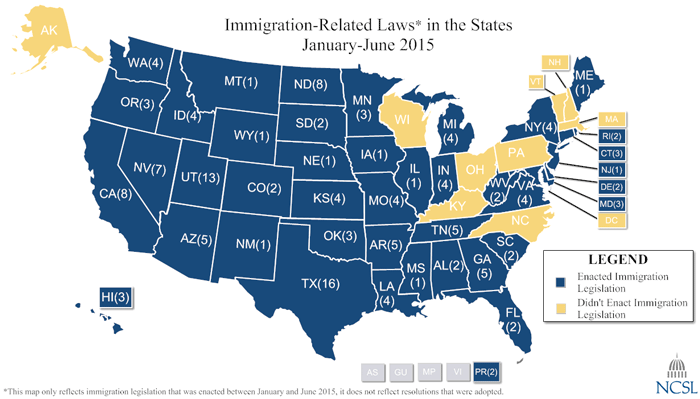SEATTLE – With prospects of comprehensive immigration reform in Washington stymied by partisan gridlock, state legislators across the country are taking their own steps to deal with the millions of undocumented immigrants living within their borders.
But with no clear federal guidance and deeply divided partisan sentiment, legislators are creating a confusing patchwork of laws in which migrants are treated vastly differently from one state to the next.
“As long as Congress fails to act, the states will continue to pick up the slack and fill the gap because there are real human needs in our communities,” said Washington State Rep. Sharon Tomiko Santos (D).
In some cases, states have taken steps to allow new benefits for immigrants, including those without legal status. Legislators in Delaware and Hawaii enacted measures to allow undocumented workers to obtain driver’s licenses. California lawmakers extended the state Medicaid program to children under the age of 19, regardless of immigration status.
Other states are taking harder lines. Indiana and Texas legislators passed laws tightening requirements on employers using the E-Verify program to check worker immigration status. Texas lawmakers also passed a law requiring stakeholder meetings in communities where federal immigration officials hope to resettle refugees. And in Missouri, lawmakers barred undocumented students from receiving in-state tuition and state scholarship funds.
The divergence between red states and blue states concerns policymakers on both sides of the aisle who see an increasingly patchwork approach to immigration policy. Both Democrats and Republicans agree the problem begins in Washington, where comprehensive immigration reform died a very public death in the last Congress. But it is extending to states, where legislators have very different ideas about how to handle the influx of immigrants.
“The problem that I see is that the states are all reacting differently,” South Dakota state Sen. Craig Tieszen (R) told fellow legislators at an immigration panel sponsored by the National Conference of State Legislators. “We are passing laws in our various states that treat people very differently,” he said.
The absence of federal action is spurring renewed interest in state action. Legislators in 46 states and Puerto Rico enacted 153 laws relating to immigration reform in the first half of 2015, according to a report released Monday by the National Conference of State Legislatures.
Even in red states, the report found, immigrants are earning some new rights. Georgia legislators allowed nurses who earned degrees overseas to practice in health care facilities. Nevada has moved to prevent legal fraud against Spanish-speaking residents. And legislatures in Arkansas, North Dakota, Tennessee, Texas and Utah – all of which are controlled by Republicans – passed new laws seeking to protect immigrants from human trafficking.
Republicans nationally have sought to portray a gentler approach on immigration issues as the party struggles to appeal to Hispanic voters. In Arizona, home of some of the strictest immigration measures in the country, Republicans made a concerted effort this year to avoid debating harsh new immigration bills; the state legislature eliminated $10 million appropriated to build a border fence.
Legislators across the country have also taken steps to expand the reach of a federal exam immigrants must pass before they become American citizens. Seven states – Arizona, Idaho, Louisiana, North Dakota, South Carolina and Utah – have added portions of the citizenship test to high school cirricula.
But any real solution to immigration policy has to come from the federal level, legislators on both sides say. Without national guidance, an immigrant family living in one state faces the prospect of a much different legal regime in another.
“I don’t think any one of us would be happy with a 50-state patchwork quilt of civil rights law. Neither should we have a 50-state patchwork quilt of immigrant policies,” Tomiko Santos said.

